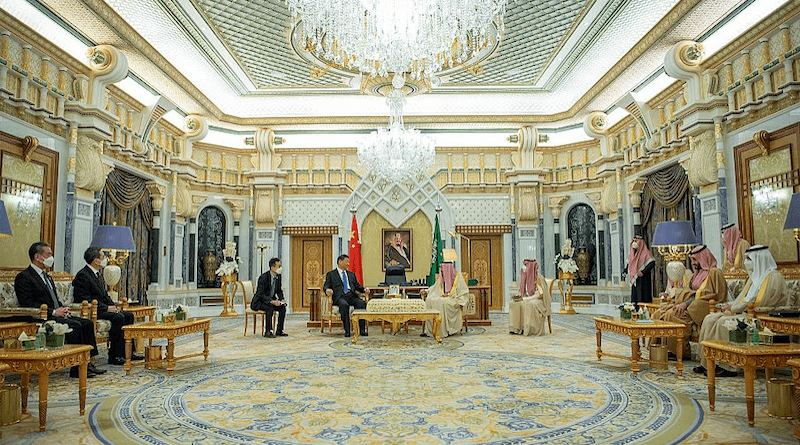China Consolidates Its Grip On The Middle East – OpEd
China’s President Xi Jinping flew to Saudi Arabia on December 7 to host a Chinese-Arab summit there. The visit had been on the stocks for some time. Xi was first invited to Riyadh back in March. The long delay – during which Xi succeeded in consolidating his long-term future as China’s president –gave the Saudis time to prepare a spectacular welcome inte3nded to reinforce the image of China as a firm ally of Saudi Arabia, and consolidate the excellent ties that already existed between Beijing and Riyadh.
The extravagant welcome prepared for the Chinese leader, which included the hoisting of thousands of Chinese banners, was in stark contrast to the low key reception granted US President Joe Biden in June. Given Biden’s often expressed refusal to exonerate Saudi Crown Prince Mohammed bin Salman (MBS) from responsibility for the brutal murder of the journalist Jamal Khashoggi, relations between the two countries remained strained throughout the president’s visit.
As for the state visit by Xi, invitations to attend the Chinese-Arab summit went out to leaders throughout the Middle East and North Africa. The Chinese delegation signed dozens of agreements and memoranda of understanding with Gulf nations and other Arab states covering a variety of areas including energy, security and investments.
The US regards China as its prime competitor for influence and profit in the Middle East. In 2017 Saudi King Salman signed a $65 billion-worth of memoranda of understanding with China. The two countries immediately began implementing agreements in sectors such as petrochemicals and high technology. Today China is Saudi Arabia’s largest trading partner worldwide, while Saudi Arabia is China’s largest trading partner in the region.
The ambitious Saudi Vision 2030 development program, designed to transform the kingdom into a modern thrusting industrialized nation no longer dependent on oil revenues, has provided Chinese construction firms with the major opportunity of developing Saudi infrastructure. During his stay XI visited the planned megacity of Neom on the western Saudi coast, a key element of MBS’s Vision 2030.
China has a thriving relationship also with the United Arab Emirates (UAE). It is the UAE’s largest trading partner, and an essential component of China’s Belt and Road Initiative (BRI).
Introduced in 2013, and heavily promoted subsequently by President Xi, the BRI is his blueprint for China’s eventual political and economic dominance. The “belt” refers to reinvigorating the historic Silk Road trade route connecting East and West, while the “road” relates to constructing a 21st century Maritime Silk Road.
Belt and Road is the centrepiece of Xi’s foreign policy. It involves China investing roughly $150 billion a year in the 68 countries across Asia, Africa and the Middle East that have signed up to the scheme. Some describe BRI as one of the largest infrastructure and investment projects in history, covering 65 percent of the world’s population; others consider it a plan for Chinese world domination through the creation of a China-centered global trading network.
Egypt features in Chinese strategic thinking. As China’s commercial activities in the Middle East mushroomed, it grew increasingly concerned with transit through the Suez Canal. As a result it has invested billions of dollars in Egypt, and Chinese firms are helping construct Egypt’s new administrative capital in the desert outside Cairo. They are also developing a Red Sea port and industrial zone in Ain Sokhna.
Then there is Israel which, of course, did not participate in the Chinese-Arab summit, although it is a key element in China’s overall Middle East policy. Israeli-Chinese relations have been excellent for decades – sometimes too close for US comfort. Finally Washington put a definitive end to Israeli cooperation on military technology with US roots. Instead, Israel developed close commercial relationships with China in areas like advanced technology and infrastructure. Today Chinese firms are deeply engaged in Israeli infrastructure, building tunnels for light rail, expanding port facilities in Ashdod and Haifa, and striking agreements to operate the ports for 25 years. There is also talk of a China-Israel Free Trade Agreement in the offing. Over the twenty years from 2001, annual bilateral trade between Israel and China has increased from $1.07 billion to $22.8 billion in 2021. This close collaboration remains unpalatable to some in the US Senate.
The US and the UK regard China’s expanding global influence as of great concern. In November 2020 the US Secretary of State’s office published a 72-page document called: “The Elements of the China Challenge”. Amid seven examples of what the authors call China’s “quest for preeminence in world affairs”, they cite the Belt and Road initiative. The idea, they believe, is to expand foreign markets for Chinese companies, thus drawing nations, and particularly their political and economic elites, into Beijing’s geopolitical orbit. Sometimes BRI projects involve 50- to 100-year relationships that confer power long-term to China over key parts of the host country’s infrastructure.
On December 1, 2020, in his first public address since becoming chief of MI6, Britain’s secret intelligence service made famous in the James Bond films, Richard Moore declared that China was the agency’s “single greatest priority”. He cited Beijing’s large-scale espionage activities in the UK, but also China’s carefully coordinated plan to lure poor countries into what Moore termed “debt and data traps”, a policy designed to consolidate Chinese influence across the globe. Causing even greater concern is the threat from China’s cyber warfare. Addressing the Aspen Security Forum in Colorado on July 21, 2022, Moore declared that China was now MI6’s top intelligence priority, surpassing counter-terrorism.
With his leadership role now firmly secured, Xi clearly feels empowered to continue developing his long-term strategy aimed at ensuring eventual Chinese political and economic dominance on the world stage. He doubtless regarded the Chinese-Arab summit as a key building block in that enterprise.

